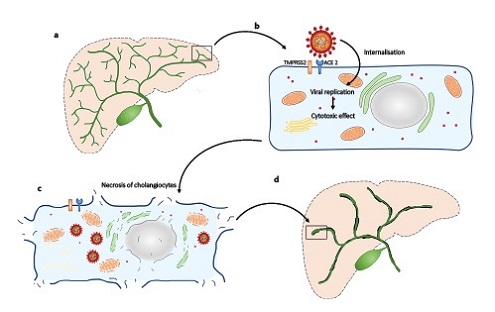COVID-19 News: German Researchers Warn That Sclerosing Cholangitis Emerging As A Consequence Of Severe COVID-19 Infection!
Thailand Medical News Team Aug 22, 2023 2 years, 6 months, 1 week, 4 days, 1 hour, 47 minutes ago
COVID-19 News: In the wake of the unprecedented COVID-19 pandemic, medical researchers worldwide have been unraveling a plethora of extrapulmonary manifestations associated with this viral infection. The implications of SARS-CoV-2, the virus responsible for COVID-19, extend beyond the respiratory system, affecting various organs. Among these emerging complications, German researchers have sounded the alarm about the newly observed connection between severe COVID-19 and secondary sclerosing cholangitis (SSC), a chronic liver disease characterized by the progressive fibrosis of bile ducts.
 Schematic overview of SARS-CoV-2 entering a cholangiocyte via ACE2 and TMPRSS2, subsequently inducing cell death and SSC. SARS-CoV-2, severe acute respiratory syndrome coronavirus 2; ACE2, angiotensin-converting enzyme 2; TMPRSS2, transmembrane serine protease 2; SSC, secondary sclerosing cholangitis
Schematic overview of SARS-CoV-2 entering a cholangiocyte via ACE2 and TMPRSS2, subsequently inducing cell death and SSC. SARS-CoV-2, severe acute respiratory syndrome coronavirus 2; ACE2, angiotensin-converting enzyme 2; TMPRSS2, transmembrane serine protease 2; SSC, secondary sclerosing cholangitis
This alarming revelation, unearthed by scientists from the University Hospital-Paracelsus Medical University Nuremberg, highlights the need for heightened awareness and further investigation into this potentially devastating syndrome.
The COVID-19 Extrapolation - Beyond the Lungs
As of August 2023, according to latest
COVID-19 News reports, the global COVID-19 case count had soared to a staggering 700 million, accompanied by over 6.9 million reported deaths. While the predominant focus of COVID-19 management has revolved around respiratory symptoms, researchers have persistently delved into the expanding list of extrapulmonary manifestations. A key factor driving this trend is the mode of cell entry employed by the SARS-CoV-2 virus. It utilizes the angiotensin-converting enzyme 2 (ACE2) receptor and the cellular transmembrane serine protease 2 (TMPRSS2) for cellular entry. These receptors are found in a multitude of extrapulmonary tissues, facilitating the virus's infiltration and potentially resulting in various complications beyond the lungs.
The Unveiling of Secondary Sclerosing Cholangitis
The German research team unearthed a startling connection between severe COVID-19 cases and the development of secondary sclerosing cholangitis (SSC). SSC is an affliction characterized by the narrowing and dilation of bile ducts, leading to fibrosis or cirrhosis of the liver. The study examined 544 cholangitis cases treated at a German tertiary care center between March 2020 and November 2021. Among them, 7 patients were identified who had developed SSC after experiencing a severe course of COVID-19, requiring intensive care treatment. This revelation prompted the researchers to explore the link between COVID-19 and SSC.
Deciphering the Patterns: Unraveling the Connection
Upon meticulous analysis, the study team observed distinct patterns in the patients who had developed SSC in the wake of severe COVID-19. Notably, their liver parameters, including gamma-glutamyl transferase (GGT) and alkaline phosphatase (ALP), were considerably higher than those observed in patients with non-COVID-19-induced SSC. Furthermore, a marked distinction was observed in the dura
tion of mechanical ventilation required for treatment. Patients in the COVID-19 group exhibited a shorter duration of mechanical ventilation, suggesting potential variations in disease progression.
Unraveling the Mechanisms: Unmasking the Factors
The study team embarked on a journey to decipher the mechanisms underlying the accelerated progression of SSC in COVID-19 patients. Their findings pointed towards a myriad of factors contributing to this phenomenon. Foremost among them was the cytokine storm, a phenomenon triggered by the viral infection that leads to the release of pro-inflammatory cytokines. These cytokines can disrupt the delicate balance of bile composition, resulting in cholangiocellular damage. Moreover, COVID-19-induced hypercoagulability, a feature observed in severe cases, potentially led to microthrombosis that impaired the blood supply to the intrahepatic biliary tree, further exacerbating cholangiocyte ischemia.
Bridging the Connection - The Role of Direct Cytopathogenic Effect
One pivotal factor shedding light on the severe cholestasis observed in COVID-19-induced SSC is the presumed direct cytopathogenic effect of SARS-CoV-2 on target cells. This virus has been observed to have a higher affinity for angiotensin-converting enzyme 2 (ACE2) receptors in cholangiocytes than hepatocytes. This preference allows the virus to gain entry and potentially replicate within these cells, causing direct damage. The upregulation of genes involved in cell death induction in infected cholangiocytes further substantiates this hypothesis.
Implications and Urgent Needs for Further Research
The implications of these findings are profound. Not only do they uncover a hitherto unnoticed consequence of severe COVID-19, but they also signal the need for vigilance and further research. The increasing incidence of COVID-19-induced SSC places an additional burden on an already strained healthcare system, potentially exacerbating the scarcity of donor organs, as liver transplantation remains the sole curative option for SSC. Understanding the intricate mechanisms behind the accelerated progression of SSC could pave the way for better treatment strategies and interventions.
Conclusion
The German researchers' pioneering study thrusts into the spotlight a novel connection between severe COVID-19 and secondary sclerosing cholangitis. This disease entity, characterized by fibrosis of bile ducts, is now emerging as a consequence of the viral infection, presenting a new challenge for medical professionals. The intricate interplay of cytokine storms, hypercoagulability, and direct cytopathogenic effects lays the foundation for the accelerated progression of SSC observed in COVID-19 patients. While further research is urgently required to validate these hypotheses, this study serves as a clarion call for heightened vigilance, early diagnosis, and tailored interventions in severe COVID-19 cases to mitigate the potential ravages of SSC. As the medical community unites to combat the ongoing pandemic, the revelations of this study exemplify the ceaseless pursuit of knowledge and understanding that underpins modern medical science.
The study findings were published in the peer reviewed journal: Digestion (Karger)
https://karger.com/dig/article/104/4/306/836104/Secondary-Sclerosing-Cholangitis-due-to-Severe
For the latest
COVID-19 News, keep on logging to Thailand Medical News.
Read Also:
https://www.thailandmedical.news/news/belgium-researchers-warn-that-more-hospitalized-covid-19-patients-are-manifesting-a-rare-chronic-liver-disease-known-as-sclerosing-cholangitis-could-b
https://www.thailandmedical.news/news/more-bad-news-for-users-of-proton-pump-inhibitors-(ppis),-as-these-gastric-reflux-drugs-are-implicated-in-cholangitis
